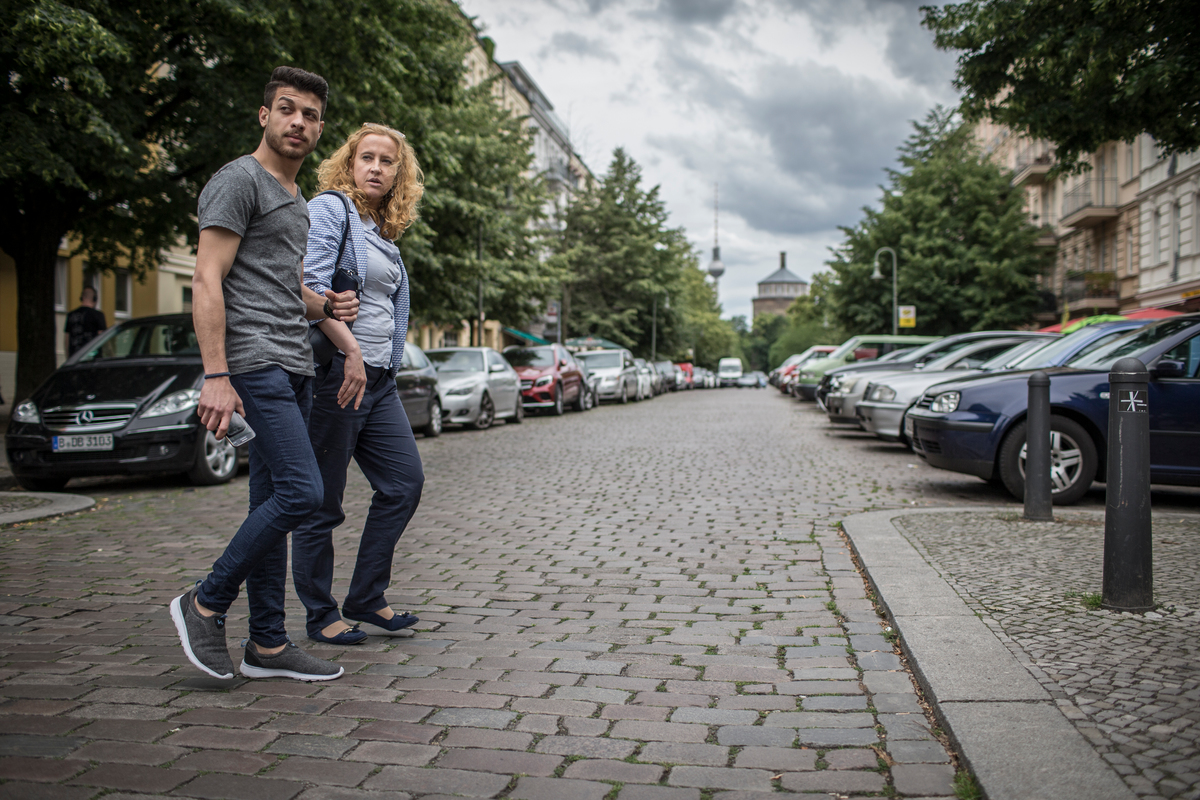Syrian band's concerts are music to German ears

Syrian band's concerts are music to German ears
Singer Abdallah Rahhal stepped on stage as the oud player picked out an intriguing tune. The musicians had met only moments before. Abdallah lifted his voice to meet the oud’s haunting semitones and something clicked. The band Musiqana was born.
This chance meeting in the depths of a Berlin winter marked the start of a new phase in Syrian refugee Abdallah’s life. Long a devotee of the traditional chanson-style arrangements of Tarab music, the trained singer had discovered a way to share memories of his lost homeland with his new host country.
“Our concerts are a piece of Syria in Berlin,” said Abdallah, 28, who fled growing violence near his home in Aleppo, north-western Syria, and arrived at a shelter outside the German capital last October. “Tarab music uses very old, clean and pure words. When Arab people hear these words, we feel like we are flying, like we're in ecstasy.”
Abdallah and oud player Alaa Zaitouna were soon joined by three more musicians, guitarist Adel Sabawi and drummers Ali Hasan and Ahmad Niou, all refugees from Syria. Abdallah’s friend Rachel Clarke, a Scottish storyteller and theatre producer, volunteered to act as the band’s manager and threw herself into organising performances.
New arrivals flocked to the concerts, eager for a chance to clap, dance and sing along to the familiar tunes of Tarab, which means “mirth” in Arabic. The players never dreamt that German audiences would be just as enchanted by the Arabic songs and their poetic lyrics. Yet Musiqana (“our music”) is steadily building a following of curious locals.
“At the beginning we didn’t expect Germans to love it, but they really do,” said Alaa, who originally came to Germany from Syria on a student visa. “It’s a beautiful world at our concerts, no nationalities, no racism or anything, just the music.”
Rachel, who first heard Abdallah singing a capella at a shelter outside Berlin last autumn, was immediately struck by the music’s wider appeal.
“The arts and music can play an amazing role in understanding each other's culture.”
“You could tell that the lyrics were special, you could tell that the other refugees were moved by them,” she said. “The songs and the melody were very beautiful, those amazing half and quarter-tones that are so typical of oriental music were all in there.”
Keen not to let Abdallah’s voice go unheard, Rachel invited the band to play at her sold-out storytelling events where refugees share memories of Syria before the war. Her aim is to introduce Berlin’s newest arrivals to the local community.
“The arts and music can play an amazing role in getting together, understanding each other's culture and in integration,” she said. There was a magic in the atmosphere at the concerts, she added. “You've shared it together and that's already the start for further communication.
“I wasn't sure that German people were going to love the music as instantly as I did. But I noticed at the first concert that there was a lot of curiosity in the room for the other culture. There were a lot of people listening very exactly to the music and to the sound and who were fascinated by it, like I was.”
Abdallah mastered the intricate melodies of Tarab music as a student at the Sabah Fakhri Institute in Aleppo, named after an internationally acclaimed Syrian singer. When he finished his studies, he set up a company exporting cosmetics and perfume and sang in his spare time.
“When the war came, everything changed in Syria,” he said. “Suddenly, everything was broken, everything was hard. I left Syria because I had no choice. It's war. War means you will find some place to save yourself.”
“My feeling when I'm singing Tarab music is like being in the sky.”
Last year, Abdallah fled to Europe via Lebanon and Turkey, risking the treacherous sea crossing to Greece and joining tens of thousands on the western Balkans route. Music helped him survive the journey.
“It was very hard,” he said. “A lot of people were sick on the way. So sometimes we sang together, sometimes we laughed. Without music it would have been much more difficult. My feeling when I'm singing Tarab music is like being in the sky. It's complete hope, like something good will happen.”
Abdallah said his passion for music helped him deal with his fears for the safety of loved ones still in Syria. Like many refugees, he lives in constant dread of hearing that one of his relatives has been killed.
“All the Syrian people there [in Syria] have a terrible life,” he said. “The music gives people hope again. They remember, we had a life, we had peace, we had a lot of things to do. It makes people think about making peace.”
He added: “When I came here I felt I have a message now. My message is to bring my culture to German people. At the same time, I can take something from their culture. When I started to do that everybody loved it. It made me feel very happy.”
Musiqana have big ambitions. The band plans to record an album and perform elsewhere in Germany and Europe, bringing Syrian music to new audiences with the aim of promoting understanding and cultural exchange.
“Everyone is going through the same process of welcoming the refugees, trying to work out how you can work together and live together,” said Rachel. “There's such a need for dialogue. I know that music can create that dialogue and help everybody to integrate together.”














